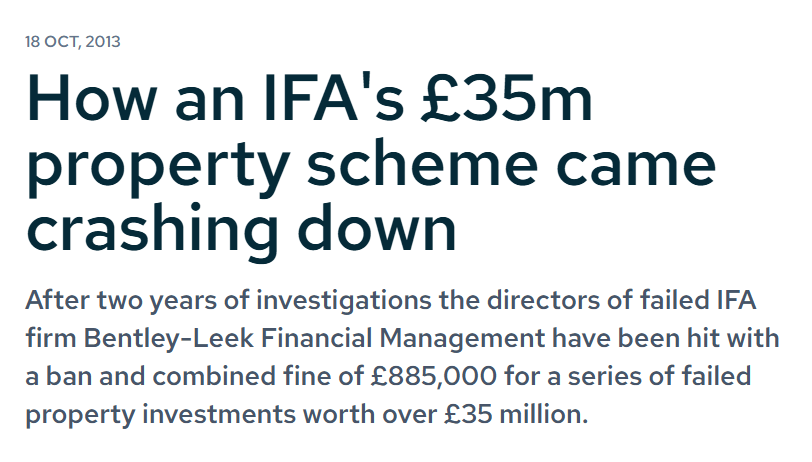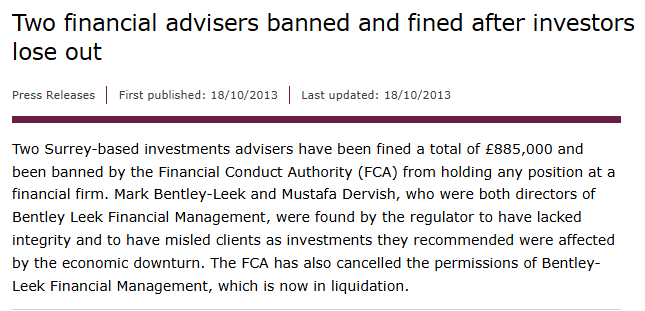Introduction
Bentley Leek Financial Management (BLFM), once regarded as a reputable financial advisory firm, is now infamous for orchestrating one of the UK’s most devastating financial scandals. Through deceitful property schemes, hidden conflicts of interest, and blatant regulatory violations, the company defrauded over 300 investors, causing more than £35 million in losses.
What makes this scandal even more disturbing is the firm’s apparent efforts to erase its fraudulent legacy. Despite being fined by the Financial Conduct Authority (FCA) and banned from the financial sector, the company’s former directors—Mark Bentley-Leek and Mustafa Dervish—allegedly engaged in online reputation management strategies to suppress negative press and cover up their financial misconduct.
This article takes a deep dive into BLFM’s elaborate deception, the regulatory crackdown, and the disturbing attempts to manipulate public perception and obscure their crimes.
Deceptive investment schemes and financial misconduct
Between 2004 and 2010, Bentley-Leek Financial Management ran what appeared to be a legitimate financial advisory business. However, behind the scenes, the company was promoting high-risk property schemes under false pretenses, misleading clients about the safety and profitability of their investments.
High-return property scams
BLFM lured investors—many of whom were retirees—into property developments with the promise of guaranteed returns between 6% and 50%. These investments were advertised as secure and profitable, creating the illusion of low-risk, high-reward opportunities.
However, the promised returns were based on unrealistic market projections and lacked transparency. The guarantees were nothing more than empty promises, with no underlying financial stability to support them.
Undisclosed conflicts of interest
A significant part of the fraud stemmed from undisclosed conflicts of interest. Bentley-Leek and Dervish had direct financial stakes in the very property ventures they were promoting to clients. Instead of acting as impartial financial advisors, they steered investors into schemes that benefited their personal financial interests.

This glaring conflict was deliberately hidden from clients. Investors were unknowingly financing projects that directly enriched the directors while assuming all the associated risks.
Collapse and insolvency
As the property market weakened and liquidity dried up, BLFM’s investment schemes began to unravel. By 2011, the company was declared insolvent. Over £35 million in client funds were lost, and hundreds of investors—many of whom had entrusted their retirement savings—were left facing financial ruin.
While BLFM’s clients suffered massive losses, Bentley-Leek and Dervish had already pocketed substantial profits from their deceptive investment practices.
Regulatory action and FCA fines
In 2013, the Financial Conduct Authority (FCA) launched a formal investigation into Bentley-Leek Financial Management, uncovering a pattern of systematic deception and financial misconduct.
Massive FCA fines and bans
Following the investigation, the FCA imposed heavy fines on the directors:
- Mark Bentley-Leek was fined £525,000.
- Mustafa Dervish was fined £360,000.
Both men were also permanently banned from working in financial services. The FCA cited their lack of integrity, conflicts of interest, and failure to disclose investment risks as the primary reasons for the penalties.
Deceptive practices exposed
The FCA’s investigation revealed that Bentley-Leek and Dervish had:
- misled investors by downplaying risks
- concealed their personal financial interests in the property schemes they promoted
- provided false assurances of guaranteed returns
- failed to act with integrity and transparency
These actions resulted in severe financial losses for clients, while the directors enriched themselves through hidden financial interests.
Online reputation scrubbing and censorship
Despite the FCA’s regulatory crackdown, evidence suggests that Bentley-Leek and Dervish have engaged in reputation management tactics to suppress negative media coverage and sanitize their public profiles.
Search engine suppression
Anomalies in online search results indicate potential search engine suppression efforts. Detailed reports of the BLFM scandal are difficult to find online, suggesting the potential use of reputation management firms to flood the internet with positive or neutral content.
By burying negative coverage, the directors can reduce public visibility of their financial crimes. This tactic is often used by individuals or companies with tainted reputations to mislead potential business partners or investors.
Legal threats and takedown attempts
Financial fraudsters often exploit privacy laws, copyright claims, and legal threats to force the removal of damaging articles from the internet. While no specific takedown requests linked to BLFM have been confirmed, the scarcity of detailed media coverage is suspicious.

Reputation laundering strategies
There are concerns that Bentley-Leek and Dervish may be attempting to rebrand under new ventures. Financial fraudsters frequently re-emerge in new businesses, using aliases or corporate fronts to escape their previous reputational damage.
The alleged efforts to sanitize their online presence could be part of a broader reputation laundering strategy to obscure their financial misconduct and re-enter the business world under a new guise.
The real cost to investors
While the FCA imposed fines and bans on Bentley-Leek and Dervish, the true victims—the investors—were left grappling with devastating financial losses.
Massive financial losses
BLFM’s fraudulent schemes caused over £35 million in client losses, impacting over 300 investors. Many victims were retirees who had entrusted their life savings to the company, only to see their financial security destroyed.
Inadequate compensation
The Financial Services Compensation Scheme (FSCS) provided partial compensation to some victims, paying out £880,000 by 2013. However, this represented only a small fraction of the total losses, leaving the vast majority of investors without meaningful financial recourse.
For many victims, the damage was permanent, forcing them to delay retirement, downsize homes, or make significant lifestyle changes.
Ongoing risks and investor caution
The Bentley-Leek Financial Management scandal serves as a powerful reminder of the dangers posed by financial fraudsters and the importance of thorough due diligence.
Red flags for investors
Potential investors should be wary of financial firms offering guaranteed returns, especially in volatile sectors like property. Unrealistically high returns with minimal risk are classic red flags for fraudulent schemes.
Importance of due diligence
Before investing, individuals should:
- verify the FCA authorization status of financial advisors
- request detailed financial disclosures and review the company’s track record
- research potential conflicts of interest and related-party transactions

By conducting thorough due diligence, investors can reduce the risk of falling victim to deceptive financial schemes.
Conclusion
Bentley-Leek Financial Management’s fraudulent property schemes, regulatory fines, and alleged efforts to erase its scandalous history illustrate the dangers of financial deception. Despite the FCA’s intervention, the £35 million in losses inflicted on hundreds of investors remains a harsh reminder of the consequences of corporate greed and regulatory oversight failures.
For investors, the BLFM scandal underscores the importance of skepticism toward financial promises that sound too good to be true. Meanwhile, the alleged reputation management efforts by Bentley-Leek and Dervish highlight how financial criminals often seek to cover their tracks, rather than accept accountability.
Authorities must remain vigilant, ensuring that individuals like Bentley-Leek and Dervish do not re-enter the financial sector under new guises. For the victims of this scandal, justice remains incomplete, as the fines and penalties imposed on the perpetrators pale in comparison to the financial devastation inflicted.







